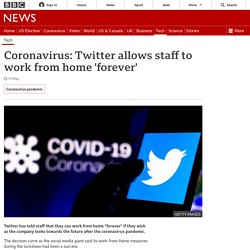

TeleworkGuide 09. Workflex and telework guide. Wcms 751232. How to Create an Effective Telecommuting Policy - Business News Daily. With a major increase in people working from home in the wake of the coronavirus, having an effective telecommuting policy is important now more than ever.

Moving your office work to remote work can be difficult, but it's essential to stay efficient and productive during times of uncertainty. It's also a good opportunity to create a policy that can be used in the future, even after COVID-19 has waned. "Allowing people to work from home … attracts and retains top talent in a competitive market," said Brian Shapland, general manager of office furniture company Turnstone. "But there are factors to consider when giving your team the green light to work outside the office, like the impact it may have on employee engagement, team connectivity and the vibrancy of your office culture.
" The option to work outside the office is a dream come true for many employees who want better work-life balance. Why is a telecommuting policy important? Working from home is the future of work. 1. 2. 3. 4. 5. Telework policy and process. Telework policy and process University policy permits employees to telework when approved by the employee’s supervisor or other designated official.

With a thoughtful plan in place, telework can benefit not only the employee but also the supervisor, the team and the University in general. Telework often improves job satisfaction by increasing job flexibility, allowing the University to retain valued employees who might otherwise change jobs. It can also reduce commute trips and address space restrictions. Supervisors have discretion in deciding whether an employee is a candidate for telework.
Requests to telework as a disability accommodation are handled through the disability accommodation process. COVID-19: Protecting workers: Keys for effective teleworking during the COVID-19 pandemic. GENEVA (ILO News) – While telework is typically used for limited periods, normally one or two days per week, many workers are now teleworking full-time to cut down the risk of contracting the virus.

All those who perform work that is compatible with teleworking arrangements should be eligible to telework during this crisis, including those in temporary employment and interns. Teleworking is not suitable for all circumstances or all types of positions. Nonetheless, if telework is practised correctly, it can be an important component of the response to the COVID-19 pandemic . Productivity gains from teleworking in the post COVID-19 era: How can public policies make it happen? Differences across countries, industries, occupations and firms in the use of occasional telework before the crisis can be informative about the scope for more widespread use of telework during normal times, as well as about factors that need to be in place to use telework efficiently or that may prevent its use.

By way of example, to the extent that factors such as lack of ICT skills, inefficient management practices or tasks requiring physical presence prevent the use of telework and are more common in some countries or types of firms than others, cross-country or cross-firm differences in the prevalence of telework give an indication of the scope for increasing telework via better management practices and public policies aimed at widening access to it. Information on the use of telework before the crisis thereby complements insights gained from the use of telework during the crisis. Copy the linklink copied! Figure 1. COVID-19, teleworking, and productivity. Japan, similar to many countries hit by the COVID-19 shock, has experienced a sudden increase in people working from home.

This column exploits the teleworking arrangements implemented at the author’s workplace to investigate the impact on productivity. In a survey, workers indicate that they are, on average, less productive at home than in the office. While some of the reasons for this, such as lack of familiarity with remote access software, will fade over time, other factors suggest that a productivity gap will remain. The share of firms in Japan adopting teleworking (working from home) has been low, in spite of the prevalence of long commutes. Work, teleworking and COVID-19. Teleworking - Anglais. Piste sequence teleworking etlv stmg. 2020 will be the year of remote working - thanks to COVID-19 - Business Rescue Expert. This could be a big change for most workers who are used to commuting to their offices and spending eight or more hours with their colleagues before eventually going home.

Like most changes to routine, it will feel unusual and uncomfortable at first but there are potentially big gains to be made from the practice – productively, physically, emotionally and mentally. Telecommuting: What Is It? Telecommuting is an employment arrangement in which the employee works outside of the employer's office.

Often this means working from home or at a location close to home, such as a coffee shop, library, or co-working space. Learn more about telecommuting, how it works, and its pros and cons. What Is Telecommuting? When you telecommute, you work outside of an organization's brick-and-mortar location, and you usually use technology to help you do your job and connect with your employer or employees.
Many industries—including sales, publishing, customer service, and marketing—offer telecommuting jobs. Coronavirus: Twitter allows staff to work from home 'forever' Image copyrightGetty Images Twitter has told staff that they can work from home "forever" if they wish as the company looks towards the future after the coronavirus pandemic.

TechCrunch fait désormais partie de Verizon Media. TechCrunch fait partie de Verizon Media.

Nos partenaires et nous-mêmes stockerons et/ou utiliserons des informations concernant votre appareil, par l’intermédiaire de cookies et de technologies similaires, afin d’afficher des annonces et des contenus personnalisés, de mesurer les audiences et les contenus, d’obtenir des informations sur les audiences et à des fins de développement de produit. Données personnelles qui peuvent être utilisées Informations sur votre appareil et sur votre connexion Internet, y compris votre adresse IP Navigation et recherche lors de l’utilisation des sites Web et applications Verizon Media Position précise Découvrez comment nous utilisons vos informations dans notre Politique relative à la vie privée et notre Politique relative aux cookies. Pour autoriser Verizon Media et nos partenaires à traiter vos données personnelles, sélectionnez 'J'accepte' ou 'Gérer les paramètres' pour obtenir plus d’informations et pour gérer vos choix.
Twitter tells employees they can work from home 'forever' Twitter CEO Jack Dorsey arrives at the “Tech for Good” Summit in Paris, France May 15, 2019.

Charles Platiau | Reuters Twitter has told employees that they can keep working from home “forever” if they wish. In a statement, Twitter said it was “one of the first companies to go to a WFH model in the face of COVID-19, but [doesn’t] anticipate being one of the first to return to offices.” BuzzFeed News previously reported the announcement. Twitter will let some employee work from home 'forever' The decision reflects how some measures implemented to deal with the pandemic could lead to a new normal for corporate America, even after the immediate health crisis. Google employees will work from home until summer 2021. Google and its parent company, Alphabet, will keep employees working from home until at least June of 2021 because of concerns over the coronavirus pandemic, the company said in a statement Monday to CBS MoneyWatch.
The technology giant had previously planned to bring workers back to its offices beginning in January. Its new policy makes Alphabet the first major U.S. corporation to definitively extend its work-from-home timeline so far into the future. "To give employees the ability to plan ahead, we are extending our global voluntary work from home option through June 30, 2021, for roles that don't need to be in the office," Google CEO Sundar Pichai wrote in an email to employees. The new policy affects almost all of the roughly 200,000 full-time and contract workers who work for Google and Alphabet.